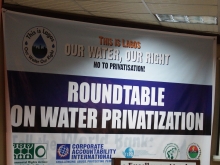Lagos water Workshop: "claims that PPP is not privatization should not be believed”

Lagos-Nigeria
On Friday, February 2, 2018, leaders of PSI affiliates in Nigeria, the Environmental Rights Action (ERA), met at a roundtable to discuss the matter in detail and draw up the plan ahead.
The people of Lagos “have made their strong opposition to water privatization abundantly clear for years,” the group said, adding that “despite the World Bank Group’s own research showing a high rate of failure for privatization projects in the water sector,” it appears to be a main proponent in this new move by their government.
ERA says if the Governor of Lagos, Akinwunmi Ambode awards the contact to Veolia, Abengoa and Metito, to manage water in Lagos for the next twenty-five (25) years, then he will be endangering the very lives of his people.
These three corporations have a global track record of abuse and mismanagement,, with some of them involved in bribery investigations spanning three countries and workers facing labour crackdowns immediately they take over the management of sectors in countries.
The roundtable attendees expresed their frustration with the World Bank’s continuous pressure since 1999 to promote private sector involvement in Lagos and at the national level, despite its own research that shows that privatization in many spheres has largely failed.
“The false notion that privatization is the only way to solve Lagos’ water crisis has contributed to the deterioration of our water infrastructure by inhibiting the adoption of other, more effective policies.”
Civil society groups in Nigeria, following a meeting of World Bank Group Managing Director and Chief Financial Officer, Joaquim Levy with Deputy Lagos State Governor, Dr. Idiat Adebule, are also frustrated by the failure of Mr. Levy to respond to or even acknowledge receipt of a letter it sent to him requesting transparency in the World Bank Group’s plans for their water sector.
The roundtable discussions, concluded that:
-
Campaigns should go beyond Lagos: With the strong push for privatization of water in Lagos going on as it seems, it is believed that with a good fight, Lagos will become a good test case for other States yet to be visited by issues of privatization to also reject it as it is being seen in Lagos. Simply put, the power to allow or disallow privatization lies squarely in the hands of the people and the earlier they take charge of it, the better.
-
The restructuring of the country should start with the economy and not necessarily on cultural grounds
-
The Chapter 2 of the Nigerian Constitution is justiciable and should be tested: Stating in parts that the Federal Government of Nigeria is duty-bound to protect the interests of its people and that sovereignty belongs to the people, the campaign is pushing a call for the government’s claims that it is not interested in business to be tested because “if the government claims it is not interested in business, then it is not interested in administering us; for running a government is business.” The issue of PPP is an issue of capacity of leaders to take decisions on how to administer the country and so if governments are running from how to manage the country to rather promoting the interests of the private sector, then it must be challenged.
-
Public service is and should be at the core of governments.
-
Nigerians are no longer frustrated but angry: Leaders agreed that at the point in which the country Nigeria is at now, its inhabitants are no longer frustrated at how abysmal government administration is towards the things that concern them – they are angry. And with such rage building up in them, it is the right time to stand up to these kinds of decisions that will go to affect them adversely in future.
-
There is the need to train members of labour unions in the fundamental ideologies of trade union movements so that they can properly join campaigns.
-
If Lagos is the center of gravity, then it must be the center of struggle: Again, there is the conclusion that what all of these seems like is for these big corporations to use Lagos as a perfect test case to be able to fully enter Nigeria and take over water privatization nationally and so if it can be fought now, then it saves the entire nation falling into the hands of unhealthy decisions of the government that does not serve the interests of the very people it has derived its power to rule from.
-
The Head of Water Services in Nigeria should henceforth be a Public Servant and not a political appointee because they do not serve the people’s interests.
-
There is the need to conduct a comprehensive research on water privatization attempts across the entire nation to be able to properly fight and educate people on why there is the need to stand up against them.
-
There is no success story of privatization in African countries like Tanzania, Rwanda and Kenya: In his presentation titled ‘Global Perspectives of Water Privatisation,’ Comrade Sani Baba lamented that the false notion that privatization is the only way to solve Lagos water crisis has contributed to the deterioration of Lagos water infrastructure by inhibiting the adoption of other, more effective policies. The solution, he states, is for the Lagos State government to prioritize a people-centered process and tools for the realization of our human right to water.

